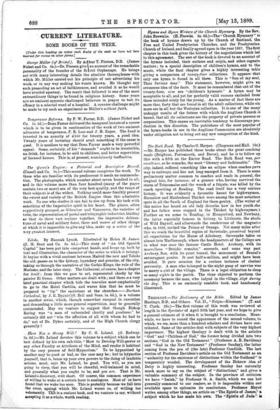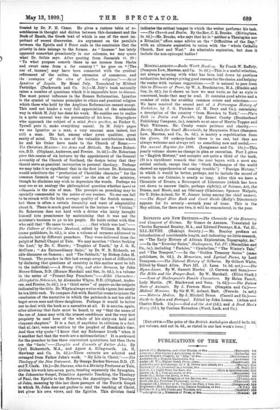THEOLOGY.—The Dictionary of the Bible. Edited by James Hastings, D.D.,
and Others. VoL II., " Feign—Kinsman." ('I'. and 'T. Clark. 28s.)—The first volume of this work was reviewed at length in the Spectator of April 30th last year, and we hope to give a general estimate of it when it is brought to a conclusion. Mean- while, we have to record the appearance of the second volume, to which, we see, more than a hundred scholars and divines have con- tributed. Some of the articles deal with subjects of the very highest importance. The highest theology is dealt with in the articles " God " and "Children of God," the former being divided into two sections, "God in the Old Testament" (Professor A. B. Davidson) and " God in the New Testament" (Professor Sanday), the :latter coming from the pen of (the late) Professor Candlish. The last section of Professor Davidson's article on the Old Testament as an "authority for the existence of distinctions within the Godhead" is temperately worded. The development of the Hebrew idea of Deity is highly interesting. Professor Sanday has naturally much more to say on the subject of "distinctions," and gives a valuable summary of the subject. In• the province of criticism we have "Isaiah," by Professor G. A. Smith, which we can but generally commend to our readers, as it is impossible within our available space to epitomise its conclusions. Professor Maydr writes, among other things, an article on "The Epistle of James," a subject which he has made his own. The "Epistle of Jude" Is treated by Dr. F. H. Chase. He gives a curious table of re- semblances in thought and diction between this document and the Book of Enoch, the Greek text of which is one of the most im- portant of recent discoveries. An argument on the parallels between the Epistle and 2 Peter ends in the conclusion that the priority in date belongs to the former. As " Incense" has lately appeared somewhat prominently in our columns, we may quote What- Dr. Selbie says. After quoting from Jeremiah vi. 20: " To what purpose cometh there to me incense from Sheba and sweet cane - from a far country ? " he goes on " [The user of, incense] may have been connected with the gradual refinement of the cultus, the extension of commerce, and the .:contagion of the rites of heathen religions."—Saint Ignatius of Loyola.. By Henri Joly Translated by Mildred Paitridge. (Duckworth and Co. 3s.)—M. Joly's book naturally raises a number of questions which it is impossible here to discuss. The most potent influence in the Roman Reformation, Ignatius is the symbol of various principles in ethics and practical religion which those who hold by the Anglican Reformation cannot accept. This need not • hinder a very full appreciation of the admirable way in which M. Joly has done his work. He enables one to realise in a quite unusual way the personality of his hero. Biographers who approach the subject of a saint jlexis genibus, as Father G. Tyrrell puts it, make everything unreal. In M. Joly's pages we see Ignatius as a man, a very unusual man indeed, but still a man. He had, among other great qualities, great sanity of mind. This is one of the valuable contributions which he and his Order have made to the Church of Rome.— The Christian Minister : kis Aims and Methods. By James Robert- son, D.D. (Oliphant, Anderson, and Ferrier. 3s. 6d.)—Dr. Robertson gave this course of six lectures by the appointment of the General Assembly of the Church of Scotland, the design being that they should serve as practical instruction in pastoral theology. Perhaps we may take it as significant that in the first lecture Dr. Robertson would substitute the "production of Christlike character" for the common formula of "saving souls " as the aim of the ministry, though he disclaims any wish to depreciate the words. Perhaps we may use as an analogy the philosophical question whether aper,1 or €1.8aitiovia is the aim of man. The precepts on preaching may be specially commended to the notice of our readers. No one can fail to be struck with the high average quality of the Scotch sermon , but there is often a certain formality and want of adaptability about it. There is much good counsel in the lecture on "Visiting." Dr. Robertson- does not hold with a divine who lately brought himself into prominence by maintaining that it was not the minister's business to go to his people. He holds rather with One who said that " He came to seek that which was lost"— Vie Culture of Christian Manhood, edited by William H. Saltoun (same publishers, 3s. Gd.), is also a volume of sermons addressed to students, but by different preachers. They were delivered from the pulpit of Battell Chapel at Yale. We may mention " Christ Seeking the Lost," by Dr. C. Harris ; "Trophies of Youth," by J. G. R. McClure ; " An Extraordinary Saint," by Dr. W. R. Richards, an able discourse on Samson ; and "The Sabbath," by Bishop John H. Vincent. The preacher in this last sweeps away a host of difficulties by declaring that questions of casuistry in this matter must be left to the individual.—A Strong City, and other Sermons, by John Morin Gibson, D.D. (Horace Marshall and Sim, 3s. 6d.), is a volume in the series of "Present-Day Preachers."—Bible Characters: Ahitophel to Nehemiah, by Alexander Whyte, D.D. (Oliphant, Ander- son, and Ferrier, 3s. 6d.), is a "third series" of papers on the subjects indicated by the title. Dr. Whyte always writes with vigour, but surely he is a little rash. To compare Job with Barzillai seems to ignore the conclusion of the narrative in which the patriarch is not too old to beget seven sons and three daughters. Perhaps it would be better not to deal with the book as a narrative at all. It is unwise, again, after allowing that facts must be heard, to say " that the name of the son of Amoz may with the utmost confidence and the very best propriety be used here of the whole of his sixty-six bold and eloquent chapters." It is a fact, if anything in criticism is a fact, that xL-lxvi. were not written by the prophet of Hezekiah's time. And then why quote " I know that my Redeemer liveth " when it is another fact that the words are a mistranslation ? It is awkward for the preacher to lose these convenient quotations, but then there ate the "facts."---Thoughts and Counsels of Father John. By Cyril Biekersteth, M.A., and Agnes A. Illingworth. (A. R. Mowbray. and . Co. .1s. 6d.)—These extracts are selected and arranged from Father John's work, " My Life in Christ."—The Theology of the New Testament. By George Barker Stevens, D.D. (T. and T. Clark. 12s.)—Dr. Stevens, who is a Divinity Professor at Yale, diVides his work into seven parts, treating separately the Synoptics, the Johannine Gospel, Primitive Apostolic Teaching, the Theology of Paul, the Epistle to the Hebrews, the Apocalypse, the Theology of,Toli.n,-meaning by this last those passages of the Fourth Gospel in which St. John does not profess to read the teaching of Christ, but gives his own views, and the Epistles. This division itself indicates the critical temper in which the writer performs his task. —The Church and Realm. BY the Rev. C. E. Brooke. • (Rivingtons. 2s. 6d.)—Mr. Brooke, who says that he is "neither a Theologian nor a Ritualist," offers some advice on the " Difficulties of the Day," with an ultimate aspiration to union with the " whole Catholic Church, East and West." An admirable aspiration, but does it include the non-episcopal bodies if







































 Previous page
Previous page